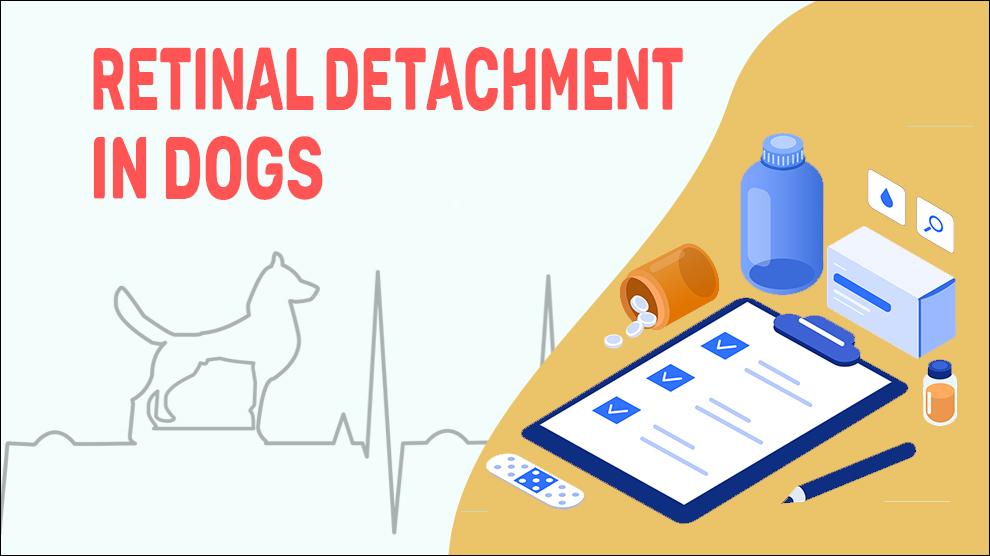Retinal detachment is an eye problem that happens when the retina (a neuroectodermal tunic layer at the back of the eye that senses light and sends signals to the brain) lifts away or detaches from its underlying layer of support tissue(retinal pigment epithelium) at the back of the eye.
Canine Retinal detachment occurs most often from the fluid accumulation beneath the retina, because of some pathologic process either within the eye or elsewhere in the body.
This is not painful by itself, affects both eyes, and causes blindness, although not necessarily at the same time. It is rare for dogs to have retinal detachments from birth, but sometimes detached retina that develops in the puppyhood are usually connected with severe, hereditary birth defects in the eye.
Retinal detachment is often secondary to other conditions such as trauma (including previous ocular surgery), metabolic disorders, high myopia or vitreous disease, vascular disease, choroidal tumors, or degeneration, uveitis, or thinning of the peripheral retina (lattice degeneration), retinoschisis, etc.
Symptoms Of Retinal Detachment
- Impaired vision or blindness
- Dilated pupils with no or slow pupillary light reflex
- Swelling of the orb
- Front portion of the eye becomes inflamed/discolored
Treatment Options For Retinal Detachment
The treatment of your dog will be directed on the underlying cause of the detachment.
For example,
- Rhegmatogenous detachment: surgery that includes titanium tacking, vitrectomy, use of expandable gases, and Laser retinopexy.
- For immune diseases - Systemic corticosteroids.
- For clotting problems- Vitamin K therapy and blood transfusions.
- Hyperviscosity and other circulatory disorders- Intravenous fluids.
- There are no treatments for some types of retinal detachments - congenital detachments and degeneration of the retina-associated detachments.
Home Remedies For Retinal Detachment
- Gently wash the eyelids using baby shampoo and/or applying warm compresses to the eyes.
- The initial healing period in dogs following surgery is approximately 2 weeks. All through that period, make your dog wear a cone or other protection and have their movement limited to leash walks only.
Prevention Of Retinal Detachment
The best way to prevent from retinal detachment is maintaining proper eye hygiene with products engineered specifically for dogs and maintaining overall health.
Affected Breeds Of Retinal Detachment
English Springer Spaniel, Bedlington Terrier, American Cocker Spaniel, Miniature Schnauzer, Samoyed, Labrador Retriever, Border Collie, Shih Tzu
Additional Facts For Retinal Detachment
1. Causes:
Congenital Causes: Collie eye anomaly, multiple ocular defects, folding of the retina, etc.
Circulatory Causes: Hyperviscosity syndrome, polycythemia, hemophilia, etc.
Infectious Causes: Fungal infections (histoplasmosis, blastomycosis, coccidioidomycosis, and cryptococcosis); parasitic infestations (larval migrans, protothecosis), and certain bacterial infections (septicemia).
Inflammatory/ Immune-mediated Causes: Uveodermatologic syndrome, inflammation of the retina and choroid, Systemic lupus erythematosus, etc.
Toxic Causes: Antifreeze and sulfa products.
Degenerative Causes: Chronic glaucoma, cataract extraction, and removal of luxated (dislocated) lenses.
Traumatic Causes: Blunt trauma with hemorrhage or inflammation and Penetrating injury.
Cancerous causes: Tumors of the optic nerve, melanoma, lymphosarcoma, and metastatic tumors.
2. Types
Hereditary or primary retinal detachment:
- Inherited weakness or retinal dysplasia
- Most common in older dogs
- Both eyes are at risk.
Acquired Rhegmatogenous detachments
- This is due to retinal tears
- Glaucoma, cataracts, intraocular tumor, trauma, and chronic inflammation inside the eye (uveitis)
Acquired non-rhegmatogenous detachments: Fluid accumulation in between retina and retinal pigment epithelium at the back of the eye.
- Hemorrhagic – neoplasia, trauma, etc
- Exudative –metastatic tumors and infections such as cryptococcosis and brucellosis
- Transudative –hypertension and uremia
3. Mortality:
There is no documented mortality due to this condition
4. Diagnosis:
- Complete blood count (CBC)
- Biochemical profile
- Ocular ultrasound
- ERG or Electroretinogram to check the dog’s vision
- Cerebrospinal fluid (CSF) tap
5. Prognosis:
The prognosis for dogs diagnosed with retinal detachment has never been better with today's medications available. Most dogs enjoy a pain-free life with careful attention and monitoring.
If the condition is not diagnosed earlier in the course of the disease or if it has progressed to deep detachment, the pet may lose its vision or may not respond fully to the treatment.
When To See A Vet
Contact your vet right away, if you notice any of the following:
- Impaired vision or blindness
- Dilated pupils with no or slow pupillary light reflex
Food Suggestions For Retinal Detachment
- Pick seafood over the usual beef and chicken.
- Omega-3 oily fishes such as salmon, tuna, cod, etc.
- Leafy greens such as spinach, kale, watercress, etc.
- Nonmeat/plant protein sources such as nuts, Lentils, Beans, Eggs, etc.
- Citrus fruits or juices.
- Sweet potatoes, tomatoes, pumpkin.
- Pork, tuna, Oysters.
- Blueberries, Broccoli, cabbage, carrots.
Conclusion
The prognosis for return of vision is poor to guarded as the detachment may also indicate the presence of a serious disease in the dog. Once therapy has been started, some retinas may reattach but the return of vision is uncertain.
After the initial treatment, monthly checkups are recommended and retinal attachments have to be closely monitored. Eye medications have to be administered according to the vet’s instructions.

















